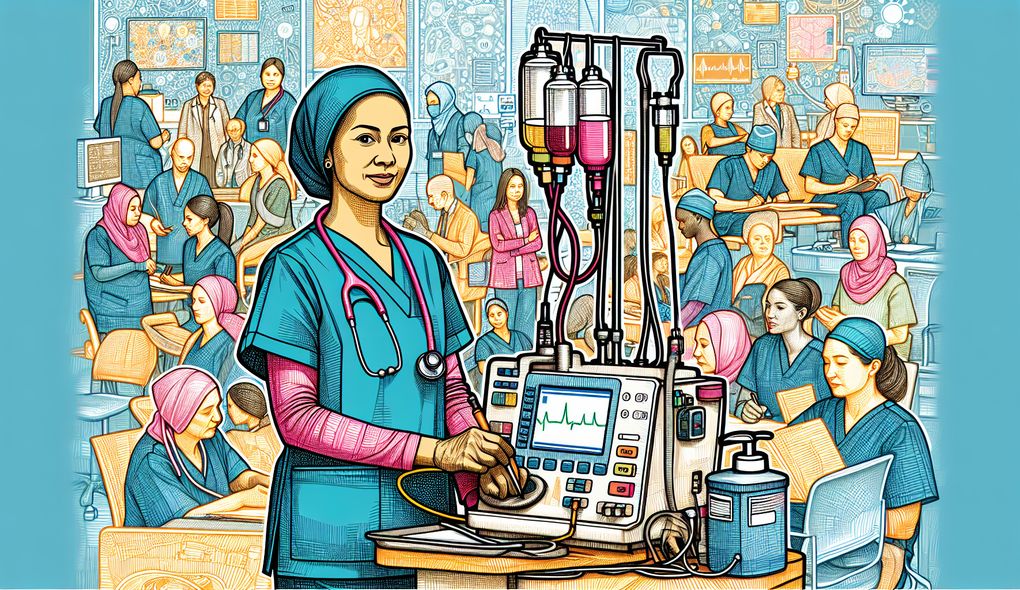How would you handle a patient who is experiencing severe side effects from chemotherapy treatment?
INTERMEDIATE LEVEL

Sample answer to the question:
If a patient is experiencing severe side effects from chemotherapy treatment, I would first assess the situation by observing the patient's symptoms and vital signs. I would then communicate with the oncologist and other members of the healthcare team to discuss the best course of action. Depending on the specific side effects, I may recommend adjusting the dosage or frequency of the chemotherapy, prescribing supportive medications to manage the symptoms, or providing additional interventions such as IV fluids or blood transfusions. Throughout the process, I would prioritize open and clear communication with the patient and their family, ensuring that they understand the treatment plan and are involved in the decision-making process.
Here is a more solid answer:
In handling a patient experiencing severe side effects from chemotherapy treatment, my approach would start with a thorough assessment of the patient's symptoms and vital signs. I would utilize my knowledge and clinical skills in oncology nursing to identify the specific side effects and their potential causes. To effectively manage these side effects, I would collaborate with the oncologist and other healthcare team members to develop an individualized care plan. This may involve adjusting the dosage or schedule of chemotherapy, prescribing appropriate supportive medications, or implementing non-pharmacological interventions like relaxation techniques or dietary modifications. Additionally, I would provide comprehensive patient education on managing side effects at home and ensuring open communication channels for any concerns or emergencies. My compassionate and patient-centered care approach would prioritize empathy and emotional support for the patient and their family throughout the treatment journey.
Why is this a more solid answer?
The solid answer expands on the basic answer by providing more specific details about the candidate's expertise in oncology nursing, clinical skills, and ability to manage complex health situations. It also highlights the candidate's knowledge of the latest cancer treatments and protocols, as well as their compassionate and patient-centric care approach. However, it can still be improved by including examples of past experiences in managing severe side effects and demonstrating a strong understanding of psychological support for the patient and their family.
An example of a exceptional answer:
In my role as an Oncology Nurse Practitioner, encountering patients experiencing severe side effects from chemotherapy treatment is not uncommon. To address this, I would begin by conducting a comprehensive assessment of the patient's symptoms, taking into account the specific side effects, their severity, and impact on the patient's quality of life. Drawing from my extensive experience in the field, I would formulate an evidence-based plan of care tailored to the individual patient's needs. This may involve collaborating with the oncologist to adjust the chemotherapy regimen, prescribing appropriate medications to manage the side effects, and implementing supportive interventions such as nutritional counseling, integrative therapies, or referrals to specialist services. Recognizing the emotional toll that severe side effects can have on patients and their families, I would prioritize open and empathetic communication, ensuring they feel heard, supported, and involved in the decision-making process. Throughout the treatment journey, I would provide ongoing education and empower the patient to actively participate in self-care management. In cases where the side effects pose a significant threat to the patient's well-being, I would advocate for timely interventions, such as hospital admission or consultations with supportive care teams. By addressing not only the physical symptoms but also the psychological and emotional aspects, I aim to provide holistic care that promotes the best possible outcomes for the patient.
Why is this an exceptional answer?
The exceptional answer expands on the solid answer by providing even more specific details about the candidate's experience and expertise in managing severe side effects from chemotherapy treatment. The answer demonstrates a deep understanding of evidence-based care, integrative therapies, and comprehensive support for patients and their families. It also highlights the candidate's proactive approach in advocating for necessary interventions and collaborating with multidisciplinary teams. The exceptional answer showcases the candidate's commitment to holistic care and promoting the best outcomes for the patient.
How to prepare for this question:
- Familiarize yourself with common side effects of chemotherapy and their management strategies.
- Stay updated on the latest advancements in cancer treatments and protocols.
- Develop strong communication and patient teaching skills.
- Practice critical thinking and problem-solving in complex health situations.
- Take part in continuing education courses or certifications related to oncology nursing.
- Seek opportunities to gain hands-on experience in an oncology setting.
- Reflect on past experiences working with cancer patients and learn from challenging cases.
- Develop a compassionate and empathetic approach to patient care.
What are interviewers evaluating with this question?
- Clinical skills in oncology nursing
- Communication and patient teaching skills
- Ability to manage complex health situations
- Knowledge of the latest cancer treatments and protocols
- Compassionate and patient-centric care approach

